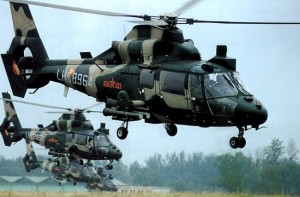Global Crude in Transit Reaches Record 1.24 Billion Barrels as Supply Surges
A flotilla of crude oil on the world’s oceans expanded to a fresh high as producer nations keep adding barrels and the tankers sail further for deliveries.

 By Solomon Moore, Wall Street Journal
By Solomon Moore, Wall Street Journal
NAIROBI—Kenyan helicopters launched airstrikes in neighboring Somalia on Wednesday, striking at bases of al Shabaab, the Islamist militant group blamed for a string of abductions and suicide bombings in east Africa.
The Kenyan attacks entered their fourth day as France announced that one of its citizens, a 66-year-old woman who had been abducted last week from her home on the Kenyan coast and taken to Somalia, had died in captivity. Al Shabaab militants are also believed to be connected to last week’s abductions of two Spanish medical workers.
Officials in Kenya, east Africa’s biggest economy, said Wednesday they were pursuing the Somali militants to protect Kenya’s people as well as its economy, where tourism is vital as drought hammers the key agricultural sector. Kenyan officials also said they hope to establish a security buffer between Somali militants and their own border.
Kenya’s military coordinated the aerial attacks with its ground troops as well as with forces allied with Somalia’s Transitional Federal Government. Kenyan troops pressed about 75 miles into Somalia.
Kenyan military officials declined to say how many troops are involved in the operation, but said they had fanned out along Somalia’s central border region and would go as deep into its territory as necessary to pursue al Shabaab.
“The objective is to diminish al Shabaab so that they cannot fire a single round, and to allow the Somali federal government to take over security for the people of Somalia,” Kenyan military spokesman Emmanuel Chirchir said.
Al Shabaab militants vowed to take revenge for the Kenyan incursion. Analysts warn Kenya could find itself on the defensive again. “It will be a tough fight on the ground,” said Andrews Asa Attah Asamoah, a senior researcher for the Institute for Security and International Studies, an African think tank.
Kenya’s attacks came as France’s government announced the death of Marie Dedieu, a cancer-stricken French woman who was kidnapped last week. Kenyan authorities say a group from Somalia abducted Ms. Dedieu from Manda Island in Kenya’s Lamu archipelago on Oct. 1, leaving behind her wheelchair and medication.
French authorities didn’t offer specifics on how they had learned of Ms. Dedieu’s death. The cause and location of her death also remained unclear.
“This was an act of unqualified barbarism, violence and brutality,” said French Foreign Minister Alain Juppé. “We condemn this in the strongest possible terms. We did everything possible to try to obtain her release. We tried to send medication by numerous different channels, and apparently these savages could not care less.”
Ms. Dedieu’s kidnapping followed the abduction of two South African sailors from their yacht a year ago. On Sept. 19, militants kidnapped a British tourist from a resort near Lamu after killing her husband. On Oct. 13, two Spanish logistical staffers with Doctors Without Borders were abducted from a refugee camp just south of the Somalian border. Their Kenyan driver was shot and wounded. Those attacks prompted the Kenyan military to launch its strikes.
“It had gotten so intolerable and unacceptable that something had to be done,” Macharia Kamau, Kenya’s ambassador to the United Nations, said Tuesday in New York. “What’s the point of having a military if we can’t even protect our own border?”
Joseph Kinyua, a high-ranking official in Kenya’s Ministry of Finance, said the military action was going to be expensive, but not as costly as allowing militants to continue to infringe upon Kenyan sovereignty.
As Somali militants vow revenge, Kenyan authorities have stepped up security. The Kenyan national police said two British teenage subjects were deported Wednesday from Kenya after they were investigated on suspicion that they were al Shabaab recruits.
Relations between Kenya’s government and Somalia’s provisional government have often been tense, but so far the two governments appear to be cooperating. In a joint statement, Kenya and Somalia vowed “to pursue any armed elements that continue to attack both countries.”
Al Shabaab, which has pledged its allegiance to al Qaeda, has been working to expand attacks beyond Somalia to countries that are seen as supporting a government it is fighting to overturn. In July 2010, al Shabaab-supported militants set off multiple bombs in Uganda’s capital, Kampala, killing dozens. Uganda’s military is among those in the region supporting a Somalia government that still controls only parts of the country.
Al Shabaab controls much of southern Somalia. It ceded most of Mogadishu after offensives in recent months by the Mogadishu-based peacekeeping force, the African Union Mission in Somalia. The city, Somalia’s largest, was a profit center for the fundamentalist armed group, where it taxed merchants and ran smuggling and protection rackets.
The militants have also been hurt by the killings of several of their leaders by recent U.S. airstrikes and by the revolutions in Libya, Yemen and Tunisia, which are among countries in the Middle East and North Africa where diplomats say al Shabaab militants have drawn funding.
In the wake of such setbacks, al Shabaab appears to have teamed up with Somali pirates to hold foreign vessels and their crew hostage as a way to raise revenue through ransoms. In recent months, these abductions have taken place on land.
Christopher Rhoads in New York contributed to this article.

Sign up for gCaptain’s newsletter and never miss an update

Subscribe to gCaptain Daily and stay informed with the latest global maritime and offshore news
Essential news coupled with the finest maritime content sourced from across the globe.
Sign Up